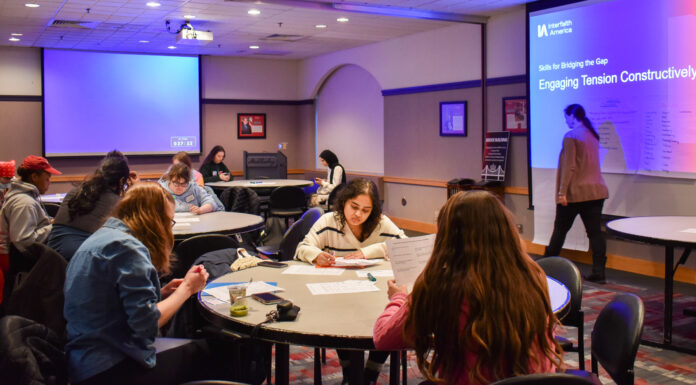
Tuesday, Jan. 23 marked the first meeting of the Bridging the Gap Program for 2024. The five-week curriculum occurred every Tuesday as an introduction for students to learn effective dialogue skills and how to apply those skills in their everyday lives. The program was developed through Interfaith America, a non-profit organization founded in 2002 by Eboo Patel. Eboo Patel is a civic leader who believes that religion can be used as a “bridge of cooperation rather than a barrier of division” (Saint Martin’s University). Muhlenberg sends students to the Interfaith America conference every summer to engage in productive dialogue with others. The program does not specifically relate to interfaith dialogue but is open to strengthening any type of dialogue.
Student Facilitator Rachel Jones ‘27 said, “This program hopes to help people to stop and think instead of hearing and reacting. As much as we may want to reply and rebuttal something that we disagree with just to get our opinions across, we should listen in the same way that we want to be heard. Hopefully, this mindset helps allow for tough conversations to happen in even our closest friend groups.”
The student facilitators all went on the Alliance for Justice and Active Leadership (AJAL) retreat. The AJAL retreat has been going on for 14 years at Muhlenberg and has been employing dialogue as a method for social change.
Jones said, “The goal of the program isn’t to change people but to change the way we think about others and the way that we react to others who believe something we don’t. Also, to help people understand that everyone is different and that we all come from different backgrounds that make us think the way we think and make us who we are.”
The first week of the program is called “Identifying Your Motivations and Values.” During this session, students think about why they want to build bridges in the first place. This week is not used to convince them but rather to encourage them when it gets difficult to converse with someone who holds differing views from them. Harli Strauss-Cohn ‘24, who is a double-major in Sustainability and International Studies, said that “the definition of bridge-building we discussed on the first day of the program is that it’s about ‘engaging across differences in ways that respect identities, foster mutual relationships and seek a common good.’”
In the second week, titled “Five Skills of Deep Listening,” students learn specific skills that will help them succeed in understanding another person’s viewpoint. For instance, one skill of deep listening is silence, where one person says nothing as the other person expresses their perspective and opinion. Another skill is footprint, which means repeating small things back to the other person that they just said. By repeating the person’s words back to them you affirm their speaking value and experience. It’s important to remember that dialogue is a two-way street. Jones also says, “I firmly believe that ‘two wrongs don’t make a right,’ and if you are not willing to listen, learn or hear others, then you are wrong. Not your opinion, not your perspective, but you. I think that Bridging the Gap does a great job of implementing and educating on the importance of listening to others and finding value in conflicts of interest. Also, I just knew that the program would be a great way to get involved in conflict prevention.”
In the third week, entitled “The Power of Storytelling,” students had the chance to learn what makes a story effective, memorable and powerful. This session also taught students how to tell stories when they are in difficult situations so that they know exactly what details and certain aspects they want to include in their stories. This week is about people’s origin story and the sharing of their beliefs and values.
In the fourth week, called “Engaging Tension Constructively,” students dive deeper into listening and storytelling. Students learn how to approach a conversation when faced with a difference of opinion. They learn how to listen deeply and also how to share their stories with conviction, in a posture of ‘strong back and soft front,’ Buddhist teaching. Having a ‘strong back’ means being courageous and resilient. When you have a ‘strong back,’ you will feel fearless, grounded and have a sense of belonging. Having a ‘soft front’ means staying gentle and open in the midst of difficult situations. It’s about embracing vulnerability and discomfort.
Then in the fifth week, titled “Applying your Skills,” student facilitators construct a plan to think concretely about how they are going to connect their newly developing skills for their leadership on campus. The students take the dialogue skills they learned, and model social change on campus and in their communities. One element of creating social change is the further education of dialogue. The program will end on Tuesday, Feb. 27, but will hopefully leave students more knowledgeable and skilled on how to discuss difficult topics in their everyday life.
By learning how to engage in skillful and productive dialogue, students can hear other’s perspectives without argument and conflict. This is crucial because “Life is a continuous process of learning,” said Reverend Janelle Neubauer. “If we don’t engage in conversation around differing beliefs or information that sometimes challenge our own modes of thinking, then we’ll remain stagnant. That will only limit our individual growth and growth in the community and can be detrimental to the communities that surround us. Instead, practicing the skills necessary for dialogue offers us a way to hear about the lived experiences of our community and, in turn, to better articulate our own experiences. This is how we keep learning, growing and building bridges.”





















